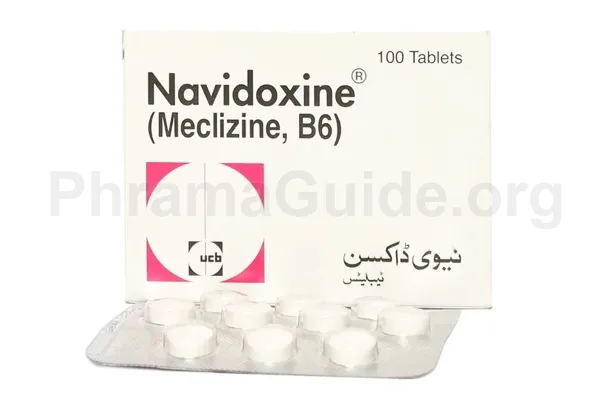Navidoxine tablet is a medication that is used to treat or prevent symptoms of motion sickness and vertigo. It can be used for the treatment of nausea and vomiting during pregnancy. Following are some common and off-label uses of Navidoxine Tablet:
Common Uses of Navidoxine Tablet
- Pregnancy-Related Nausea and Vomiting: Navidoxine tablet is commonly used to alleviate nausea and vomiting during pregnancy, a condition commonly known as morning sickness. Navidoxine is considered safe for use during pregnancy and is often recommended as a first-line treatment.
- Motion Sickness: Navidoxine tablet is also used to prevent and treat symptoms of motion sickness, such as nausea, vomiting, and dizziness, caused by various forms of transportation, including cars, boats, airplanes, and amusement park rides.
- Vertigo and Vestibular Disorders: Navidoxine tablet is often used to relieve vertigo and dizziness associated with inner ear disorders, including Meniere’s disease, labyrinthitis, and vestibular neuritis. It helps reduce the abnormal sensory signals sent to the brain, thus alleviating symptoms.
Off-label Uses of Navidoxine Tablet
- Migraine Headaches: Navidoxine tablets may be used off-label as an adjunctive treatment for migraines, particularly for the relief of associated dizziness and vertigo.
- Menopause-Related Symptoms: Navidoxine tablet has been used to alleviate symptoms such as hot flashes, dizziness, and vertigo associated with menopause.
- Anxiety and Tension-Related Dizziness: Navidoxine tablet has been occasionally used off-label to manage dizziness and imbalance caused by anxiety or tension. It may help reduce the sensory disturbances associated with these conditions.

What is Navidoxine?
Navidoxine is one of the leading brands with the combination of Meclizine + B6, manufactured and marketed by AGP (Pvt) Ltd, Pakistan.
Navidoxine Alternatives : Other Similar Brands
Below are some available similar brands that can be used as an alternative to Navidoxine:
- Sevidoxine : Bloom Pharmaceuticals (Pvt) Ltd, Pakistan.
- Wedoxine : Webros Pharmaceuticals, Pakistan.
- Meclo : P.D.H. Pharmaceuticals (Pvt) Ltd, Pakistan
Navidoxine : Available Formulations and Strengths
Presently, Navidoxine is available in Tablet Form with the following strengths.
Navidoxine Tablet : Meclizine 25mg + B6 (Pyridoxine) 50mg strengths.
Who Should Not Use Navidoxine?
Navidoxine does not typically have specific contraindications when used within recommended doses. However, some general considerations regarding contraindications and precautions for Navidoxine use.
Allergy or hypersensitivity: If you have a known allergy or hypersensitivity to Navidoxine or any other related medications, you should avoid using this medication.
Glaucoma: Navidoxine can potentially increase intraocular pressure, which can be problematic for individuals with glaucoma. It is important to use Navidoxine with caution or avoid it altogether if you have glaucoma, as it may worsen the condition.
Urinary retention: Navidoxine may cause urinary retention or difficulty in urination. If you have a history of urinary retention or any urinary problems, it is important to discuss the use of Navidoxine with your healthcare professional.
Pre-existing medical conditions: It is important to inform your healthcare professional about any pre-existing medical conditions you may have, including liver or kidney disease, cardiovascular conditions, or any other significant health issues. They can assess the potential risks and benefits of Navidoxine in light of your specific medical history.
What is the Recommended Daily Dosage of Navidoxine?
Navidoxine Dose for Nausea and Vomiting:
One tablet, three times a day.
How Navidoxine Works?
Navidoxine is a combination of meclizine and vitamin B6 (pyridoxine) that works through their mechanisms of action.
Here’s an overview of their mode of action:
- Meclizine: It is an antihistamine with antiemetic properties. It works by blocking the action of histamine, a chemical involved in the body’s response to motion sickness and inner ear disorders. By inhibiting histamine receptors in the brain and inner ear, meclizine helps reduce the stimulation of the vestibular system, which plays a role in balance and spatial orientation. This action helps alleviate symptoms such as dizziness and vertigo associated with motion sickness and vestibular disorders.
- Vitamin B6 (pyridoxine): It is involved in various physiological processes, including the synthesis of neurotransmitters such as serotonin. It is thought that vitamin B6 helps reduce nausea and vomiting by enhancing the metabolism of certain substances involved in the emetic (vomiting) response. The exact mechanism by which vitamin B6 exerts its antiemetic effects is not fully understood but is believed to involve its role in neurotransmitter regulation.

Leave A Comment